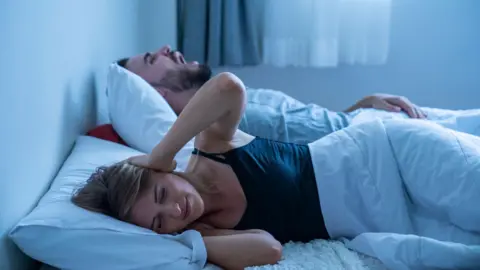Hopes epilepsy drug can help reduce snoring
 Getty Images
Getty ImagesAn epilepsy drug could help people with a common breathing problem that causes them to snore and gasp loudly at night, it has been claimed.
Sulthiame, a drug sold under the brand name Ospolot, appeared to reduce symptoms of obstructive sleep apnoea in a recent international clinical trial of 298 patients.
Lead author Jan Hedner, professor of respiratory medicine at Sahlgrenska University Hospital in Gothenburg, Sweden, found improvements in those on the highest doses of the drug.
Bhik Kotecha, consultant ear, nose and throat surgeon at Nuffield Health Brentwood Hospital, Essex, said lifestyle changes such as weight loss and reduced alcohol intake could also help with sleep apnoea.
Professor Kotecha described sleep apnoea as a condition in which a patient stops breathing momentarily, but repeatedly, during sleep.
He said: "The main symptoms of sleep apnoea include snoring, poor and fragmented sleep, periodic gasping for breath, morning headaches and daytime sleepiness."
Ms Hedner found after 12 weeks, those taking Sulthiame had up to 50% fewer occasions where their breathing stopped and higher levels of oxygen in their blood during sleep.
A common misconception is that snoring and sleep apnoea are the same thing.
What causes general snoring?
"Snoring occurs as a result of a turbulent airflow and can affect both children and adults," explained Mr Kotecha.
"If the airway becomes constantly obstructed, then the patient could develop sleep apnoea."
Children often snore due to enlarged tonsils and adenoids.
"There is a plethora of evidence that demonstrates that the removal of tonsils and adenoids in these children dramatically improves their quality of sleep as well as their cognitive function," said Mr Kotecha.
"In adults, the problem could be due to an obstruction in the nose as a result of a deviated nasal septum or nasal polyps.
"More commonly, it is the redundant, floppy soft palate in the throat that is the culprit."
But, because the majority of symptoms happen when asleep, it can be hard to detect.
How can it be treated?
As the effects of Sulthiame need to be investigated further, Mr Kotecha said there were other ways to treat the condition.
Options included nasal CPAP (continuous positive airway pressure), oral appliances, nasal sprays, antihistamines and lifestyle changes like weight loss and reduced alcohol intake.
Surgeries such as minimally invasive radiofrequency surgery, tonsillectomy and laser or robotic surgery can also be offered to select patients.
"Minimally invasive radiofrequency surgery can improve the upper airway by shortening and stiffening the soft palate, reducing the bulkiness of the tongue and improving nasal patency," added Mr Kotecha.
Follow Essex news on BBC Sounds, Facebook, Instagram and X.
